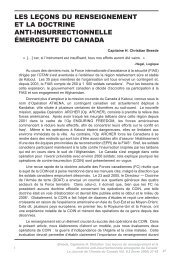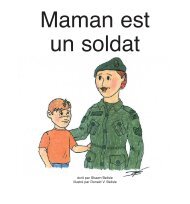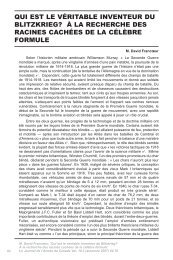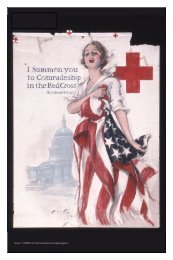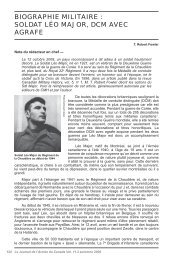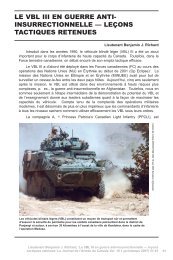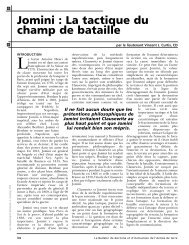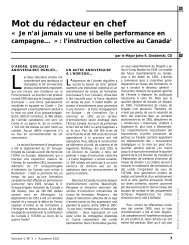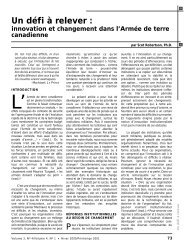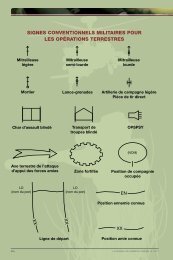The Canadian Army Journal
The Canadian Army Journal
The Canadian Army Journal
Create successful ePaper yourself
Turn your PDF publications into a flip-book with our unique Google optimized e-Paper software.
146<br />
Finally, congressional leaders today should take heed. <strong>The</strong> Bush-led concentration<br />
of power in the executive branch is far from unique, as US presidents have historically<br />
played a major role as either instigators or defenders of regime change operations (from<br />
William McKinley in the Philippines through to Ronald Reagan in Grenada). Indeed,<br />
regime change sponsorship has been seized by presidents as part of their job<br />
description since the late 19 th century, a sobering thought as the US enters primary and<br />
election season this year.<br />
ANDEAN TRAGEDY: FIGHTING THE WAR OF THE PACIFIC<br />
1879–1884<br />
SATER, William F. Lincoln and London: University of Nebraska Press, 2007. 453 pgs.<br />
Reviewed by Major Les Mader<br />
Being the product of a Euro-centric education—with an<br />
emphasis on the European experience in North Americas—<br />
I am often startled to learn of major historical events that<br />
occurred in other parts of the world. Some have been of<br />
great significance in their times, and even in our own; yet<br />
their existence figures nowhere in the books and films<br />
commonly available in Canada. Even if some information<br />
is available it tends to be in the language of the country or<br />
ethnic group affected. Only when an effort is made to tell<br />
the story in English or French does the story break into the<br />
<strong>Canadian</strong> mainstream.<br />
One such event is the War of the Pacific that saw Chile<br />
defeat Peru and Bolivia in the last quarter of the 19th Century. This war changed the history and boundaries of<br />
all three countries and has bedevilled their relations ever<br />
since. It may have cost them a total of some 55,000 dead<br />
and wounded. 1 <strong>The</strong> war saw the use of machine guns, breech-loading rifles and<br />
cannons, ironclad warships, mines (land and sea) and naval torpedoes. If studied, its<br />
experiences might have informed the European and American armies on the evolving<br />
nature of combat in the lead-up to World War I.<br />
William F. Sater has written what may become the classic one-volume, English<br />
language history of this war. He is an academic and professor of history at the University<br />
of Nebraska. His writing credits include two other books on the Chilean <strong>Army</strong> and the<br />
history of Chile. <strong>The</strong> book’s bibliography fills 13 pages, including extensive belligerent<br />
sources; another 60 pages are devoted to the endnotes.<br />
<strong>The</strong> story is distributed through a lengthy introduction and 10 chapters. <strong>The</strong> first<br />
three set the scene for the war by describing its causes and comparing the opposing<br />
armies and navies. <strong>The</strong>se chapters make clear how different the fighting forces involved<br />
were from their European contemporaries, and what we would consider essential today.<br />
By way of examples, none of the armies started the war with either a logistics corps or<br />
a medical service and the Peruvian government so feared that its navy would mutiny or<br />
support a rebellion that it hid parts of the ships’ engines to make them useless.<br />
Chapters Four and Five cover the naval war that had to be won before Chile dared<br />
to conduct serious land operations in the main theatre. <strong>The</strong> severity of the disputed<br />
Atacama Desert region and the near non-existence of land based infrastructure and<br />
communication networks meant that armies had to be moved and supported by sea.<br />
<strong>Canadian</strong> <strong>Army</strong> <strong>Journal</strong> Vol. 11.1 Spring 2008


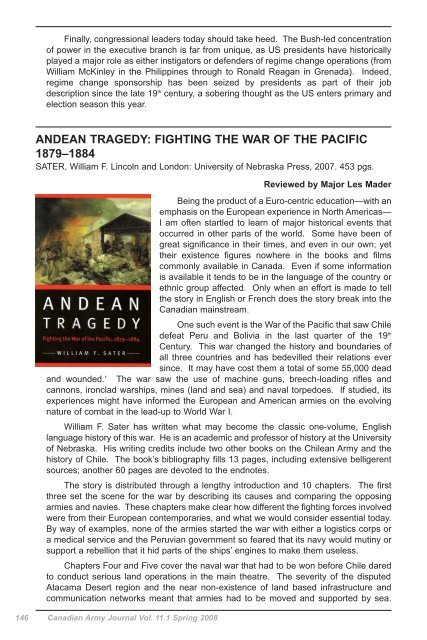
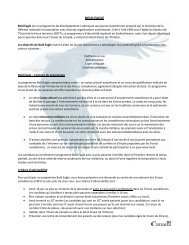
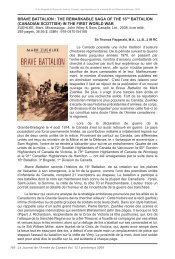
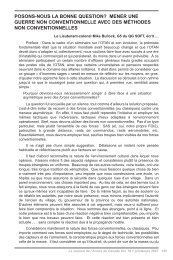
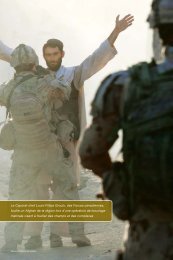
![La modularite dans l'Armee de terre canadienne [pdf 1.6 MB]](https://img.yumpu.com/17197737/1/188x260/la-modularite-dans-larmee-de-terre-canadienne-pdf-16-mb.jpg?quality=85)
